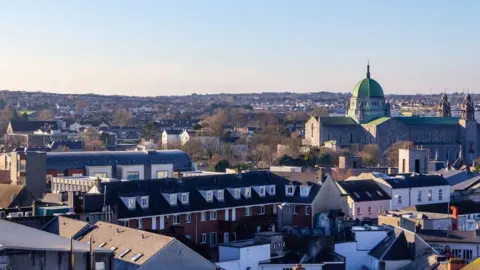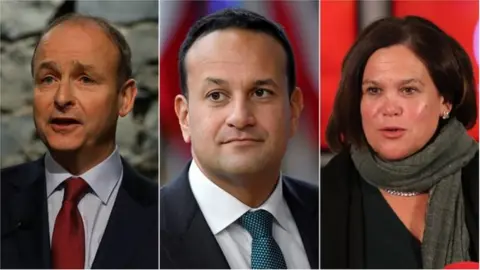Irish general election: 'Change' is key word in Irish election campaign
One word keeps coming up in Ireland's general election campaign.
"Change".
Of course, opposition parties say it's time for a switch in government.
But current Taoiseach (Irish prime minister) Leo Varadkar has also acknowledged there's a mood for change, and argues his party, Fine Gael, is bringing it about in a positive sense.
Ireland has been particularly exposed to a huge change not of its own making.
The impact of Brexit is probably felt more here than in any other EU state, not least because Ireland is the only country to have a land border with the UK.
Galway is a city on the edge of Europe, but this year it's taking centre stage.
It will be hosting one of the biggest cultural programmes in the world as European Capital of Culture for 2020.
Coincidentally, the opening ceremony will be held on Saturday 8 February, which is also the day of the election.
Galway 2020 creative director Helen Marriage points to the fact that 24% of the city's population were born outside Ireland, an example of how the country's economic growth and international outlook has attracted new residents.
She is from the UK, and speaks of "that moment when Britain ripped itself out of Europe".
"Ireland is a proud European nation, and I think the values that go with that, of welcome, and a progressive approach, are very interesting," she says.
'Fastest growing economy'
"I'm trying to reflect them in the programme."
A decade after a financial crash, Ireland's economy has recovered strongly and is now the fastest-growing in the EU.
Galway seems to be benefiting from that. It's been expanding and there are plans to develop it further in the coming 20 years in order to "rebalance" the country's economic activity, which has been largely dominated by Dublin.
But Galway has also felt the impact of one of the most difficult issues in the state.
 lisandrotrarbach
lisandrotrarbachLast year, it saw the highest increase in rent in Ireland.
According to the property website daft.ie, the average rent in the city was €1,309 - a 5.6% rise.
In Dublin, the average rent was €2,052.
Across the country, rents have increased by about 90% since the post-crash low point in 2011.
Average wages have not remotely matched that, rising by about 13%.
Postgraduate student Niamh Byrne has just found a place to live in Galway, but it took some searching.
'Defining political issue'
"I don't know when I'll be able to start saving up to buy my own home, because it's so hard to find a room to rent," she says.
She believes it's the defining political issue for people of her generation.
"When people are passionate about something they will go out and vote on the topic and I think the housing crisis is so big."
Niamh says people are "only two pay cheques away from being homeless".
"There's a lot of homelessness. You can't think people are without a place to live because it's their fault. It's not."
The housing topic formed a major part of the TV debate hosted by Irish national broadcaster RTÉ between the leaders of the three biggest parties.
Leo Varadkar said Fine Gael had invested in social housing, that house prices were levelling off and that rents had begun to decrease.
Micheál Martin, leader of main opposition party Fianna Fáil, said more affordable homes and council houses had to be built on state land.
Mary Lou McDonald of Sinn Féin said the hike in rents demanded intervention and "that we not only freeze rents, but we also have to cut them".
She was a late addition to the debate, originally envisaged as a head-to-head between Mr Varadkar and Mr Martin.

Sinn Féin's poll ratings have surged during the campaign, with one poll suggesting it is in front.
The party is to the left of Fine Gael and Fianna Fáil, which throughout their histories, have been broadly in the political centre.
Throughout the campaign, Fianna Fáil has been ahead of Fine Gael in the polls.
Fine Gael has sought to emphasise the economic recovery over its nine years in power, during which unemployment has dropped from a high of about 16% to under 5%.
Mr Varadkar has pointed out that Mr Martin was a member of the Fianna Fáil government, which was in power when the economic crash happened, and for years beforehand.
But Fianna Fáil, and other opposition parties, have claimed the benefits of the recovery are not being felt widely enough, putting the focus on issues such as hospital overcrowding and the cost of living, as well as housing.
In spite of the fact that all parties agree Brexit is a critical issue for Ireland, it has not been a huge issue in the campaign.
One main reason is that there's been a consensus among Ireland's politicians on how the EU should approach negotiations with the UK.
Dr Theresa Reidy, a political scientist from University College Cork, says there's a "strong degree of unanimity" and the main differences between Micheál Martin and Leo Varadkar are about "style rather than substance".
Mrs McDonald has stressed that for the last four years, Fianna Fáil has abstained in key votes in the Irish parliament to allow the minority government, led by Fine Gael, to operate, under the terms of a "confidence-and-supply" agreement.
Once again, no party is expected to win an overall majority of seats in the general election.
Something Fine Gael and Fianna Fáil have in common is their commitments not to go into a coalition with Sinn Féin.
They cite the party's links to paramilitary violence during the conflict in Northern Ireland, and also major policy differences.
Sinn Féin emphasises its role in the peace process.
In the TV debate, Mary Lou McDonald said it would be "undemocratic" to "set aside" her party's supporters.
It goes into the election as the third biggest party and is also the second largest in Northern Ireland, where it shares power with unionists in the devolved government.
Sinn Féin wants a referendum on Irish unity to be held within a few years.
Fine Gael and Fianna Fáil are in favour of a united Ireland in the long-term, but argue conditions are not right for a referendum at the moment.
The policy agenda of the next Irish government will be very much determined by the complex coalition negotiations, with whatever party emerges with the most seats having the edge.
After the 2016 election it took more than two months to form a government.
Parties, and observers, expect the process may once again be far from straightforward.
